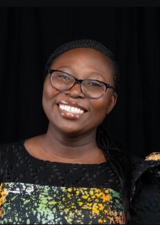
Motilola Akinfemisoye-Adejare
Motilola Akinfemisoye-Adejare teaches courses on the African Studies program in the department of Anthropology and Archaeology. Before joining the University of Calgary in July 2022, Motilola taught both theoretical and practical broadcast courses in the Media Studies department at the University of Botswana for five years. She supervised many dissertations as well as radio documentary and radio drama projects, and was instrumental in the development of the department's radio station. She is an Africanist scholar focused on the intersection of popular media, politics, journalism and technology in Africa, and has published in these areas. She also particularly interested in the representation of women politicians in Africa and what these might mean for their inclusion (or not) in governance.
Motilola worked as a journalist for Nigerian Tribune in 2006 and as an on-air anchor and newsreader at Federal Radio Corporation of Nigeria, Enugu, Coal City FM. She moved to the United Kingdom in 2010 and pursued her MA and PhD degrees at Coventry University and University of Central Lancashire respectively. Motilola has served on the advisory board of Journal of African Media Studies and is a regular peer reviewer of submissions from journals including African Journalism Studies, Journal of African Media Studies, and others.
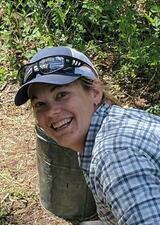
Lindsay Amundsen-Meyer
Lindsay Amundsen-Meyer has more than 15 years of experience working with heritage resources in Western Canada, in the academic, cultural resource management and government sectors. Her expertise lies in the archaeology of the Canadian Plains and adjacent Rocky Mountains, landscape archaeology, spatial analysis, and Indigenous/decolonizing archaeological approaches. Lindsay has directed and managed several large excavation programs in southern Alberta, as well as large and small scale survey programs throughout Alberta and British Columbia. She has been involved in diverse projects related to heritage resources, including archaeological sites, cultural landscapes, and historic structures, among others. Lindsay has a special interest in fostering public awareness of the history of Alberta and archaeological resources present in Alberta and in engaging with Indigenous descendant communities.
Dr. Amundsen-Meyer’s research strives to understand and incorporate Indigenous worldviews in scientific study, as well as to understand how Indigenous groups and archaeologists can create authentic partnerships which lead to more meaningful interpretations of the past. Lindsay completed her Bachelor’s and Doctoral degrees at the University of Calgary, during which she studied archaeology and museum and heritage studies. Her dissertation research incorporated Blackfoot worldviews in archaeological study, demonstrating how ideologically important features in the Blackfoot landscape influenced settlement patterning on the Northwestern Plains and the associated archaeological signatures of this influence.
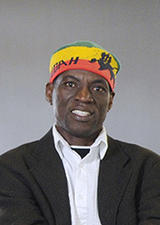
Rowland Apentiik
Rowland Apentiik's research and teaching interests lie in the areas of comparative community development; environmental and human resource management; ethnoecology; anthropological theory and methods. Much of Apentiik's research focuses on how indigenous communities engage with specific natural and social-cultural, economic and political environments, as they negotiate their survival in the unfolding context of globalization and its local manifestations. The principal aim of much of his research is to draw the attention of policy makers and agents of development to the significance of local cultural values, systems of thought, mythologies and traditions, perceptions, politics, and histories as critical considerations in the design and implementation of efficacious development projects and programs. Specifically, Apentiik's research interrogates and evaluates both conventional as well as alternative approaches to development, and provides some directions on how to recognize and respond to local stakeholders, cultural gaps, and differences in knowledge systems in development interventions.

Susanne Cote
Susanne Cote is a biological anthropologist and leader of the University of Calgary’s Primate Paleobiology Lab. Her research group studies the fossil evidence for ape, monkey, and human evolution, primarily based in East Africa. The primary focus of research is to understand how environmental pressures have shaped the adaptations of early apes and monkeys in East Africa by studying the primate fossils themselves, other mammalian fossils found in association with primates, and other paleoecological proxies. Current fieldwork takes place in northeastern Uganda and the Turkana Basin in Kenya.
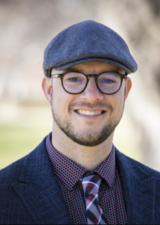
Shayne Dahl
Dr. Dahl is a sociocultural anthropologist whose research is strikingly interdisciplinary, bridging anthropology, Indigenous studies, Japanese studies, and religious studies. His forthcoming book with the University of North Carolina Press, The Secret World of Shugendō: Sacred Mountains and the Search for Meaning in Post-Disaster Japan, is based on 25 months of ethnographic fieldwork in northeastern Japan. Dr. Dahl’s teaching philosophy is grounded in principles of decolonization, interactive learning, and global perspectives. He draws richly from fieldwork with Blackfoot communities in Treaty 7, mountain ascetics in northeastern Japan, and communities in Australia, New Zealand, Mongolia, and the Americas.

Peter Dawson
Peter Dawson is a full professor in the department. His research focuses on the digital preservation of heritage sites in Alberta and the Canadian Arctic. He and his graduate students use reality capture technologies such as terrestrial and aerial laser scanning to document, archive, analyse, and preserve heritage resources that are at risk, due to the impacts of climate change and human-caused destruction. His group works with an interdisciplinary team of researchers in such areas as geomatics engineering, computer science, and art. Together they explore how technologies like virtual reality can be used to mobilise knowledge about heritage sites, especially those that are inaccessible to the public because they are too remote or dangerous to visit. Dawson have partnered with Alberta Culture and Tourism, Parks Canada, and the Virtual Museum of Canada on a variety of digital heritage projects and virtual exhibits.

Edwin Dickinson
Edwin Dickinson's research explores the intersection of anatomy and ecology in an adaptive, evolutionary context. His research combines comparative and quantitative studies of morphology with experimental approaches to elucidate key metrics of functional performance such as bite force, grip strength, and locomotor speed. His ongoing work includes projects exploring the evolution and anatomical correlates of primate handedness, morphological adaptations towards hard-object feeding, and the relationships between acoustic anatomy and vocal frequency. These projects combine traditional gross dissection with novel imaging and visualization techniques to allow the virtual, three-dimensional study of biological tissues. He is also actively involved in the development of community outreach initiatives designed to bring the fields of comparative anatomy and experimental biology to public spaces, with a particular focus on increasing scientific interest and participation among middle- and high-school students.

Jennifer Godley
With extensive training in demography and social network analysis, Dr. Godley has conducted quantitative research on the social determinants of health for over twenty years. Her work explores the mechanisms through which intersecting axes of social inequality such as social class, sex, gender, race, ethnicity, and immigration affect health behaviours, outcomes, and health care utilization. Currently, Dr. Godley is involved in two large community-based health service delivery research projects. One project aims to provide access to Hepatitis C testing and treatment for historically underserved populations in Alberta. The other focuses on improving the delivery of spirometry services to patients in rural and remote areas of British Columbia. Dr. Godley has published extensively, analyzing diverse types of data including population-level survey and Census data from Statistics Canada, administrative data from Alberta Health Services, and survey and interview data collected by her research team from practitioners, patients, students, and academics. In addition to her primary research, Dr. Godley employs social network analysis to study the evolution of collaborative research and practice teams. Dr. Godley is also deeply interested in research ethics in the social sciences, having served as the Chair of the Conjoint Faculties Research Ethics Board for the past five years. She provides specialized training in social science research ethics locally, nationally, and internationally through her work with Academics Without Borders in Africa.
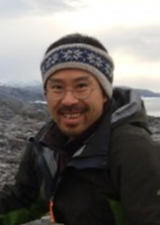
Naotaka Hayashi
Naotaka Hayashi's main research interest focusses on the relationships between humans and the environment in which they live. State of the environment, including physical features, weather, flora and fauna, is dynamic, such that inhabitants' relationship to their environment never remain static. Hayashi has been doing research in Greenland on how local residents have acquired and built knowledge and skills to live off ever-shifting environments. For example, he is investigating sheep farming in South Greenland and sea-mammal hunting in North and East Greenland to unfold how local residents adjust and develop their understanding of the environment, while coping with changing climatic variability and conditions. More recently, Hayashi has been interested in how people form and shape a future vision of happiness, hope, or well-being through their human-environment relationship.
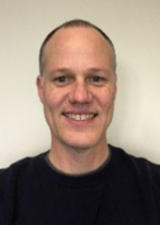
Steig Johnson
Steig Johnson's research career in Madagascar began in 1995, where he has conducted research on lemur behaviour, ecology, and population biology across the southeastern rain forests. Study systems of interest include lemur communities in forests impacted by fragmentation and cyclones, as well as a brown lemur hybrid zone. Johnson is especially interested in multi-scale approaches with the potential to link proximate ecological and broader evolutionary processes.

Jean-Rene Leblanc
As a visual artist engaged with cultural issues, critical theory and digital media, I often use a variety of media to best express the concepts with which I am working.
My creative research emphasizes an Interdisciplinary Digital Artistic approach using photographic media as a point of departure for critical thought and problem solving.
My work explores the relationship between digital technology and culture with an emphasis on technologies of interfacing, issues of play, masculinity and the body.
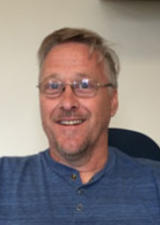
Charles Mather
Currently, I am intent on building a research program that will focus upon the relationship between environmental change and traditional systems of ecological management in Northern Ghana. I am interested in the resilience of traditional institutions centred on shrine rituals and material culture. I am a member of the UofC QES-WAS research team in the Faculty of Arts. We were recently awarded funding to carry out a multiyear project linking with faculty at the University of Legon, in Ghana. I will build my project via collaboration with faculty at the University of Legon. Upon my return, I will be seeking graduate students whose interests align with the research focus I outlined above.
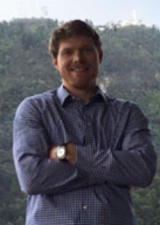
Ben McKay
Ben McKay's research interests include the politics of agrarian change in Latin America, food sovereignty alternatives, the extractive character of capitalist agricultural development, the global food system, flex crops, and the rise of emerging economies and their implications for global agrarian transformation. McKay has carried out research and maintains research interests in Bolivia, Brazil, Colombia, Ecuador and Venezuela. He is a Fellow at the University of Calgary’s Latin American Research Centre and a Research Associate and part of the Global Secretariat of the BRICS Initiative for Critical Agrarian Studies (BICAS).
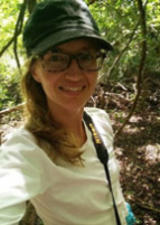
Amanda Melin
Amanda Melin addresses key areas of debate concerning the adaptive radiation of primates, including humans. In particular, she asks how primates: 1) use their senses to locate and select foods; and 2) adapt to environmental shifts in resource abundance through diet, behaviour, and symbiosis with microbial communities. By evaluating variation between and within species, she will ask how natural selection shapes the evolution of sensory systems and foraging ecology. Her work unites molecular genetics and genomics, stable isotope analysis, behavioural ecology fieldwork, and computational models of animal vision.
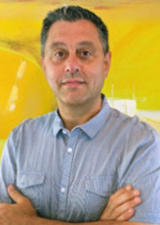
Julio Mercader
Julio Mercader Florín is a professor at the University of Calgary and the principal investigator of the SSHRC-funded project Stone Tools, Diet and Sociality. His current research focuses on human evolution, with specific regard to dietary and climatic change and how this impacted human evolution, with an emphasis on tropical ecosystems during the African Stone age. Dr. Mercader's research methods entail a multidisciplinary assessment of subsistence, diet, technology stability and change, as well as paleoenvironments. His current research is conducted at the UNESCO World Heritage site of Olduvai Gorge in Tanzania. Over the years, he has also studied a diversity of archaeological sites in Central, West, and Southern Africa. Dr. Mercader has overseen field and laboratory work in multiple contexts, ranging from undergraduate field schools to highly technical laboratory set-ups. Dr. Mercader is also a research associate with the Max Planck Institute for the Science of Human History in Germany, The Catalan Institute of Human Paleoecology and Social Evolution (IPHES) in Spain, and the Department of Geoscience at the University of Calgary. In addition to this, he is a former Canada Research Chair in Tropical Archaeology.
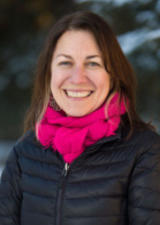
Maribeth Murray
Maribeth Murray is a human ecologist and archaeologist with interests in climate/ecosystem/human interactions. Her research is focused on the human dimensions of climate change, and human and marine system dynamics in the Arctic and sub-Arctic. Her work emphasizes the integration of anthropological, climatological, historical, oceanographical, ecological, toxicological datasets to better understand how the Arctic functions as a system with people integral to that system. Current research activities include the development of a citizen-science program for marine observing, the development of polar climate change education tools for adults, and the analysis of climate impacts in a rapidly changing north, including the response of the research community to new challenges.
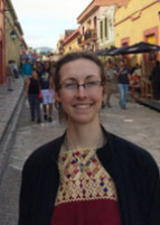
Elizabeth Paris
Elizabeth Paris is a Mesoamerican archaeologist with a focus on the Maya civilization. She researches the archaeology of urbanism, particularly urban commercial networks, the organization of market neighborhoods, and the manipulation of high-value commodities. Methodological specialties include archaeometallurgy, lithic analysis, zooarchaeology, and compositional analysis. Her research projects in highland Chiapas explore the influence of exotic, high-value goods on household economic organization among the hilltop kingdoms of the Jovel Valley (San Cristóbal region, Chiapas, Mexico), and the sociopolitical relationships between these kingdoms. Projects at Mayapan, Yucatan, Mexico, investigate the role of sub-royal elites in interregional exchange networks and luxury craft industries, focusing particularly on metalworking activities.
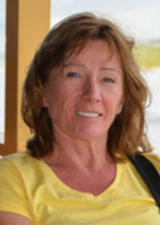
Mary Pavelka
Mary Pavelka is a biological anthropologist with interests in the evolution of menopause, the social dynamics of nonhuman primates, and the effects of hurricanes on primate populations and forests. She focused for many years on the terrestrial omnivorous female-bonded Japanese monkeys of Arashiyama West, before switching to arboreal folivorous non-female bonded black howler monkeys of Monkey River, Belize. More recently, her research efforts have targeted the fission-fusion dynamics of black handed spider monkeys in Belize.

Sabrina Peric
Sabrina Perić is an anthropologist of energy and science. She has spent nearly 10 years conducting research on the way that societies and their politics have been shaped by resource extraction, with a focus on narrative and storytelling. At UCalgary, she is co-director of the Energy Stories Lab, an interdisciplinary lab which uses the methodological tools of anthropology, visual art and computer science, and the community-based approaches of digital storytelling to document, collect and reveal how individuals and communities across Canada are working to create energy transitions and sustainable futures in practice. For more information, see www.energystorieslab.ca .
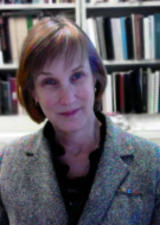
Kathryn Reese-Taylor
Kathryn Reese-Taylor is interested in the development of complexity, early sedentary communities and agricultural adaptations, archaeology of urbanism, landscape archaeology, and spatial analysis. She has directed several projects in the Maya region at important sites, such as Naachtun in Peten, Guatemala, and is currently the director of the Yaxnohcah Environmental and Archaeological Research Project in the southern Campeche, Mexico. The project focuses on environmental changes, human-environment interaction, and the development of urbanism in the Maya lowlands.
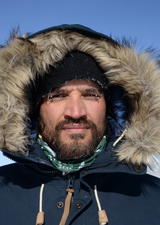
Vivek Venkataraman
Vivek Venkataraman studies the ecological context of human evolution through field studies of human and nonhuman primates. His particular focus is on foraging behaviour, energetics, locomotion, and life history. He is the co-founder and co-director of the Orang Asli Health and Lifeways Project (OAHeLP), a systematic and comparative study of biology, health, behaviour, and culture among the Orang Asli, the indigenous peoples of Peninsular Malaysia. The current research foci of OAHeLP is the rise of chronic non-infectious diseases over time due to rapidly changing environments. He is also co-director of the Guassa Gelada Research Project a long-term study in northern Ethiopia of the behaviour and ecology of the grass-eating specialist gelada monkey (Theropithecus gelada). Dr. Venkataraman combines in-depth study of the foraging behaviour of geladas with analysis of fossils to shed light on the evolution of the grazing niche in primates.
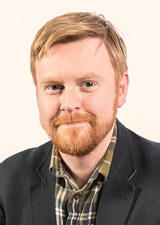
Matthew Walls
Matthew Walls studies the deep history of community-environment relationships, and how people come to perceive and act together in a world that is always in flux. His work produces theory on the role of creativity in long term process, and focuses on questions that address the ecology of knowledge, how it is constructed and attuned between generations, and the dynamics of practice-based communities through time. His research projects explore these topics within hunter-gatherer communities and he directs archaeological and ethnographic fieldwork in Greenland and Czech Republic.
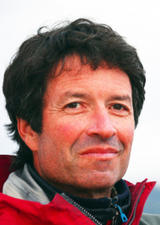
Warren Wilson
Warren Wilson is a biological anthropologist who studies the health of people in developing countries. In doing so, he considers health in light of physiology, culture, and evolution. His early work focused on children in urban Colombia, Amerindians in both the Colombian Amazon and Guyana’s rainforests, and refugees in Canada. More recently, he has conducted work in Tanzania and Nicaragua to document health and its predictors among mothers and their children. This research considers the relationship between an array of predictors (e.g. food insecurity, social capital, sociodemographics) and a model that captures the cumulative impact of environmental challenges on overall health (allostatic load). The immediate outcome of these projects is the identification of barriers to maternal and child health in these regions, with the long-term goal of informing locally-relevant, public health measures.
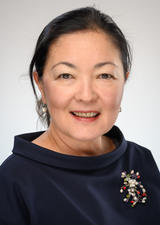
Saulesh Yessenova
Saulesh Yessenova is a sociocultural anthropologist interested in energy transition, the Cold War situation, international spectacles and infrastructures supporting energy markets and innovation. Yessenova was brought up in Kazakhstan, then part of the USSR. Her academic career as an anthropologist has brought Yessenova to Canada, but she still focuses on Kazakhstan for her research and writing.
